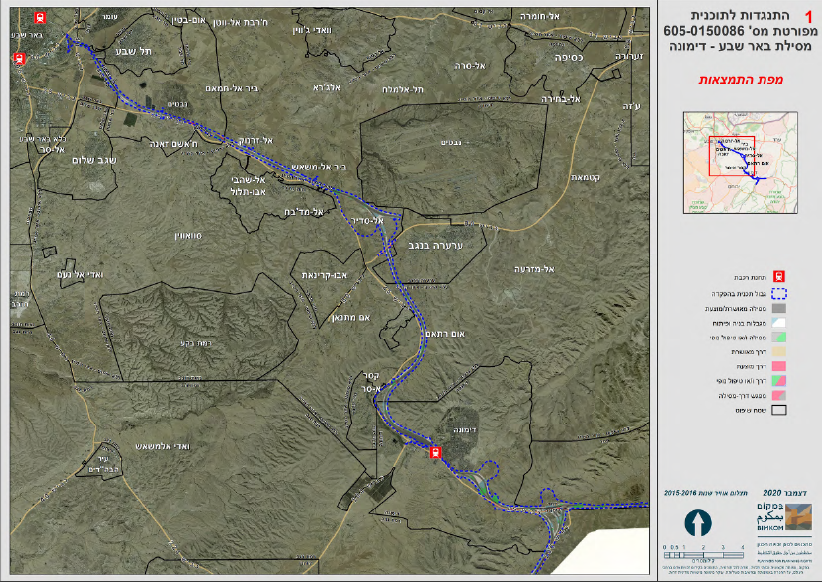Adalah, Bimkom, and the Regional Council of the Unrecognized Villages in the Naqab (Negev) Object to Planned Upgrading of Be’er Sheva-Dimona Railway
On 7 December 2020, Adalah – The Legal Center for Arab Minority Rights in Israel, together with Bimkom– Planners for Planning Rights, filed an objection to the Southern District Planning Committee against a master plan to upgrade the train line between Beer Sheva and Dimona. The objection was filed on behalf of 130 Bedouin women and men living in unrecognized villages affected by the plan, including those whose homes are under threat (the villages are home to around 15,000-20,000 people in total). As the objectors argued, the plan ignores the very existence of people living in villages located in the vicinity of the railway, and offers them no access to the train service. A hearing on the objection was held on 24 February 2021.

The objections subcommittee at Southern District Planning Committee rejected the objection on 28 April 2021, and on 13 May 2021, Adalah, Bimkom and the Regional Council for the Unrecognized Villages in the Naqab filed a request for permission to appeal to the National Council for Planning and Building. The request was rejected on 13 June 2021.
The objectors contended in the appeal that the subcommittee's decision failed to examine the arguments by the objectors. Rather, it gave an insufficient general statement noting that the plan is, in fact, the implementation of two government decisions: Decision 1421 from 24 October 2010 and Decision 4223 from 2 February 2012. The planning committees’ reliance on general government decisions in these critical matters for thousands of affected community members constitutes, in practice, a failure to exercise discretion and responsibility imposed on the planning authorities by law. The planning institutions have a duty and a responsibility to examine not only all of the planning and engineering aspects of a plan’s implementation, but also the social aspects involved and the implications of the plan on the rights of those affected.
In addition, the objectors argued that the plan and the subcommittee’s decision raise many principle, sensitive, and controversial issues for the public. The railway expansion is a national infrastructure plan that covers an area of over 14,000 dunams of land, and its route crosses an area in which around 80,000 Bedouin citizens of Israel live in recognized villages, in unrecognized villages, and in locales that are in the process of being recognized. This vulnerable group is, in fact, the only community affected by the route, and it disproportionately violates their constitutional rights, as well as the rights of the people living in close proximity to it.
Further, the objectors contend that the plan strikes the wrong balance between the need and the purpose for this national infrastructure project and the rights of the affected communities and individuals. As emphasized in the objection, the plan treats the area in which Palestinian Bedouin citizens of Israel reside as an empty area devoid of any planning restrictions. For the residents, the effect of the railway upgrade is a matter of urgent public importance, whereas for the planners, the purpose of planning the railway is preeminent.
Among the most problematic aspects of the plan is that it envisions the demolition of dozens of buildings, which are used for housing and for the livelihoods of hundreds of Bedouin families, and at the same time, it endangers the health and safety of hundreds of buildings and residents in its vicinity, in close proximity to the railway. No thorough check or mapping of the building types was undertaken, and most importantly, no clear alternatives to the plan were proposed or compensation offered for the people harmed by the plan.
Morever, the planned railway is not even going to serve the Bedouin residents of the area, as it is to be fast train without a local stop. Even in this regard, the plan harms the local Bedouin residents, while seeks to offer better services to neighboring Jewish Israeli communities.
CLICK HERE to read the objection [Hebrew]
CLICK HERE to read the planning committees’ decision [Hebrew]
CLICK HERE to read the appeal [Hebrew]
CLICK HERE to read the planning committees' decision rejecting the request to appeal [Hebrew]
















